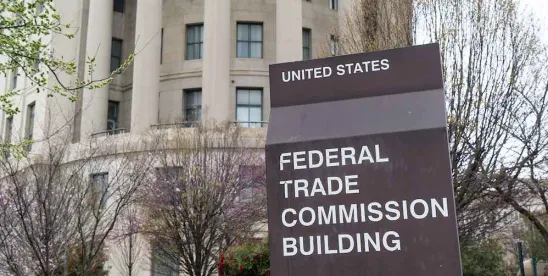Yesterday, in a 3-2 vote, the Federal Trade Commission approved a final Rule that generally prohibits non-compete agreements for most workers. Click here for the full text of the final Rule.
- What Does the Rule Do?: Subject to a few limited exceptions noted below, the Rule: (a) broadly bans post-employment non-compete agreements going forward; (b) requires employers to notify workers that the employer will not pursue legal action against them based upon their non-competes; and (c) bars employers from telling workers that they are subject to a non-compete or threatening enforcement of a non-compete unless the employer has a good-faith basis to believe the final Rule is inapplicable in that particular situation.
- What Is a Non-Compete that Is Banned?: Generally, a “non-compete” prohibits an employee from working for a competitor within a certain geographic area. However, the Rule broadly defines “non-compete clauses” as any terms or conditions of employment that prohibit a worker from, penalize a worker for, or function to prevent a worker from (1) seeking or accepting work in the United States with a different person where such work would begin after the conclusion of the employment that includes the term or condition; or (2) operating a business in the United States after the conclusion of the employment that includes the term or condition.
- Who Is Covered?: The final Rule will apply to nearly all employers in the United States and cover almost all workers (including independent contractors). Although the FTC does not have jurisdiction to oversee non-profit entities, it has taken the position that “entities that claim tax-exempt nonprofit status may in fact fall under the Commission’s jurisdiction” and references hospitals and healthcare entities that claim tax-exempt status. Thus, even non-profit entities should carefully review the final Rule and guidance to determine if they are subject to the ban on non-compete.
- Exceptions:
- Exception for Sale of Business Transactions: The final Rule permits non-competes drafted in connection with the bona fide sale of a business or business entity, regardless of the amount or percentage of the seller’s ownership stake. However, there are some nuances to this exception.
- "Senior Executives" - Limited Grandfathering Exception: There is a limited and temporary exception for “senior executives.” The Rule defines a “senior executive” as a worker in a “policy-making position” who earns total annual or annualized compensation of at least $151,164. Notably, “senior executives” of company subsidiaries and affiliates may not qualify for this exception and should be closely scrutinized. Further, this exception is temporary as “senior executive” non-competes existing before the Rule’s effective date are grandfathered in and will be allowed, but the Rule bans non-competes with “senior executives” after the effective date.
- Exception for Current Litigation: The Rule does not apply to causes of action relating to a non-compete agreement accrued prior to the effective date.
- What Alternatives Are There?:
- NDAs & Non-Solicitation Agreements: The Rule does not generally prohibit employers from implementing non-disclosure/confidentiality agreements or agreements barring a former employee from soliciting the business’s clients/customers or from soliciting/recruiting other employees, unless the NDA or non-solicitation provision is written so broadly that it effectively operates like a non-compete and precludes the worker from working after their employment ends.
- Training Repayment Agreements: The Rule also does not prohibit employers from entering into agreements that require workers to pay the employer (or a third-party entity) for training costs if the worker’s employment terminates within a specified time period, as long as the required payment is reasonably related to the training costs incurred by the employer.
- Garden Leave: Employers may pay employees for what is commonly referred to as “garden leave” – i.e., paying an employee to “sit on the sidelines” for a certain period of time.
- Existing State Laws: The Rule would supersede any state or local laws that conflict with the final Rule.
As soon as the Rule is published, it will go into effect in 120 days. However, there is significant controversy regarding the FTC’s authority to issue this Rule, and several lawsuits have already been filed challenging the Rule. Courts may enter an injunction staying the enforcement of the Rule during this 120-day window, and, although uncertain, there is a possibility that all or part of the Rule could be stricken.
This action by the FTC is obviously significant. Until now, the federal government basically left it up to each state to establish Rules and boundaries for non-competes, and most states (including Florida) generally recognize that non-competes are permissible as long as they are supported by a company’s legitimate business interests. However, the FTC action reflects a growing trend among many state legislatures that have recently moved to ban or severely restrict the use of non-compete agreements. Even if the FTC’s Rule does not go into effect, it is likely that non-compete agreements will remain a topic of conversation in state legislatures and at the federal level.




 />i
/>i
